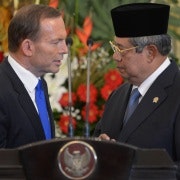Will the CCA swing Australia's climate debate?
Environment Minister Greg Hunt has played down the inquiry the government has accepted into emissions trading, but examination of the detail in its terms of reference suggests it shouldn't be underestimated.
The inquiry was the condition Clive Palmer extracted for PUP support of the Direct Action legislation, and focus has been on spending taxpayers' funds on something the Coalition says it will never implement under any circumstances.
Hunt cast the inquiry narrowly on Sunday, telling Sky that Palmer's request was “to have a review of what other countries are doing. I was very happy to do that”.
But other countries' schemes are only the start of it. The terms of reference for the review, to be undertaken by the Climate Change Authority, cover almost everything about an ETS and more.
It will “assess whether Australia should have an emission trading scheme in the future and what conditions should trigger the introduction of such a scheme”.
The review must consider:
Whether the US, China, Japan, South Korea, and the EU have established emissions trading schemes or equivalent schemes;
Australia's international commitments and undertakings under the United Nation's Framework Convention on Climate Change and the Kyoto Protocol;
Whether Australia should introduce an ETS that does not harm businesses' international competitiveness.
The review is also to consider what future emissions reduction targets Australia should commit to as part of an effective and equitable global effort to achieve the objective of the UNFCCC and subsequent agreements to which it is a party.
It has three reporting dates – and look at the detail of what each report is to cover.
By June 30 the authority is to issue a draft report, for public consultation, on what future targets Australia should agree to. This is in good time before the December Paris climate conference that will consider post-2020 targets.
By November 30 it will produce a draft report on an ETS, for public discussion.
Its final report, due by June 30, 2016, will be on “what action Australia should take to implement outcomes flowing from the [Paris] conference”.
Part of the deal also was that the government would appoint one person nominated by PUP and agreed to by the government as an associate member of the authority for the review.
The authority is headed by Bernie Fraser, former head of Treasury and former Reserve Bank governor. He was appointed to his position by Labor and believes carbon pricing should be part of the “policy toolbox” to tackle emissions.
It is true the government can and no doubt will ignore the recommendations of the authority. But the review can potentially affect the climate debate next year and in the run-up to the election.
Hunt noted on Sunday that the Australia Institute had been involved in the negotiations for the deal. Key Institute players are its head Richard Denniss and Ben Oquist, its strategy director who was right-hand man to former Greens leader Bob Brown (and for a while to Christine Milne). Oquist now informally but actively advises Palmer, while keeping channels open across the spectrum.
Denniss and Oquist – who back carbon pricing and deep emission cuts – wanted to see Direct Action passed with modifications as the best that can be achieved at the moment. They want maximum pressure applied on the issue of post-2020 targets and to keep emissions trading on the agenda. Via Palmer, they have achieved a remarkable amount.
They've also indirectly helped Bill Shorten, who has said he will take emissions trading to the 2016 election. The inquiry will produce a great amount of authoritative data as Labor prepares its policy. It would be surprising if it did not come down in favour of emissions trading, which would back Shorten's case. But if it did not, that would provide political cover for a Labor retreat in the event the opposition decided one was necessary.
Palmer – who originally said he'd never support the Direct Action legislation and had a starting point of a “dormant” ETS – rejects the proposition he has just folded.
He says changes were made to the legislation and the ETS debate has been kept alive for the election.
“Some people in Labor would have liked to put it to bed,” he told The Conversation Saturday night. If in two years Direct Action hasn't achieved progress towards the target of 5% emission reductions (on 2000 levels), he predicts there will be a “groundswell” for an ETS. “We believe the final [Climate Change Authority] report will be very positive towards an ETS, which will make it a strong political issue” at the election.
Hunt on Sunday again expressed confidence that the Direct Action program will enable the government to achieve the promised 5% target by 2020. He would not speculate on what target Australia would put forward for post-2020.
The initial auctions under the Emissions Reduction Fund would be held in the first quarter of next year, he said. The pipeline of abatement projects was greater than expected. “My message to business, to farmers and to households is very clear – the Emissions Reduction Fund is open for business. We are looking for abatement … I think that that's a very positive way of reducing emissions, as opposed to an electricity tax.”
 Michelle Grattan is a professorial fellow at the University of Canberra.
Michelle Grattan is a professorial fellow at the University of Canberra.
Michelle Grattan does not work for, consult to, own shares in or receive funding from any company or organisation that would benefit from this article, and has no relevant affiliations.
This article was originally published on The Conversation. Read the original article here.













